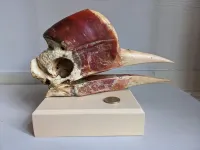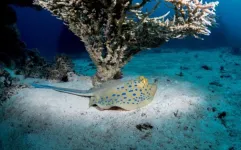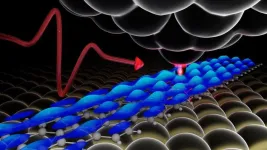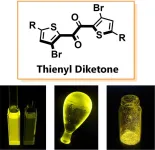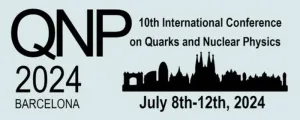(Press-News.org) A new study of curriculum reading material at the University of Glasgow finds that 94% of recommended Tropical Ecology authors are white, and that 80% of authors are affiliated with universities outside of the tropics. Dr Stewart White, Senior Lecturer at the School of Biodiversity, One Health and Veterinary Medicine at the University of Glasgow, UK, intends to change that.
“Tropical rainforest research was long the preserve of rich white men and the resulting literature was the same,” says Dr White. “This historical bias in tropical research and publication is still reflected in reading lists and recommended sources in higher education.”
Dr White and his team compiled data on the genders, ethnicities, countries of origin and institutional affiliations for authors on the University's Tropical Ecology subject recommended reading list. As well as published papers, data was sources from institutional websites, LinkedIn and personal websites.
The results of the study show that 94% of the authors were from non-BAME backgrounds, nearly 79% of authors were male, and 80% of the authors were from universities or institutions in the global North and not from the tropics.
“Our results were sadly not surprising, with the vast majority of the 340 authors categorised as male and white,” says Dr White. “Institutional affiliation and country of origin were similarly heavily biased towards North America and Europe, with a significant minority of South American institutions and Brazilian authors represented, and Asia and Africa were hugely under-represented.”
Dr White would like to make changes in the curriculum to widen the scope of recommended authors and allow for greater representation of local research. “I am currently working to update the reading list for the Tropical Ecology option and looking to replace existing recommendations for more recent papers covering similar research, but written by local scientists affiliated with institutions based in the tropics,” he says.
Dr White would also like to implement discussion sessions and tutorials to discuss this issue directly with students.
Dr White hopes that this research will help to set the record straight on the current publication bias within higher education. “Ecology research is not just for people from rich countries that have access to resources, equipment and prestige academic journals,” he says. “There is huge potential to use the knowledge, intelligence and interest of people in the tropics to conduct research and to spread knowledge at all levels of education.”
This research is being presented at the Society for Experimental Biology Annual Conference in Prague on the 2-5th July 2024.
END
Decolonizing the Tropical Ecology curriculum
2024-07-04
ELSE PRESS RELEASES FROM THIS DATE:
Exploring the casque anatomy of aerial jousting helmeted hornbills
2024-07-04
New research reveals how the surprising internal anatomy of the helmeted hornbill’s casque allows it to withstand damage during aerial jousting battles with rivals. Researchers hope that this new understanding can help to conserve this critically endangered species, as well as provide new insights into developing impact-resistant bio-mimetic materials.
“When I started in Hong Kong, I visited City University of Hong Kong (HKU)’s conservation forensics group to chat about their research and they introduced me to this amazing bird, to its ...
A New Blue: Mysterious origin of the ribbontail ray’s electric blue spots revealed
2024-07-04
Researchers have discovered the unique nanostructures responsible for the electric blue spots of the bluespotted ribbontail ray (Taeniura lymma), with possible applications for developing chemical-free colouration. The team are also conducting ongoing research into the equally enigmatic blue colouration of the blue shark (Prionace glauca).
Skin colouration plays a key role in organismal communication, providing life-critical visual clues that can warn, attract or camouflage. Bluespotted ribbontail ...
Cool roofs are best at beating cities’ heat
2024-07-04
Painting roofs white or covering them with a reflective coating would be more effective at cooling cities like London than vegetation-covered “green roofs,” street-level vegetation or solar panels, finds a new study led by UCL researchers.
Conversely, extensive use of air conditioning would warm the outside environment by as much as 1 degree C in London’s dense city centre, the researchers found.
The research, published in Geophysical Research Letters, used a three-dimensional urban climate model of Greater London to test the thermal effects of different passive and active urban heat management systems, including painted “cool roofs,” rooftop solar panels, ...
Single atoms show their true color
2024-07-04
One of the challenges of cramming smarter and more powerful electronics into ever-shrinking devices is developing the tools and techniques to analyze the materials that make them up with increasingly intimate precision.
Physicists at Michigan State University have taken a long-awaited step on that front with an approach that combines high-resolution microscopy with ultrafast lasers.
The technique, described in the journal Nature Photonics, enables researchers to spot misfit atoms in semiconductors with unparalleled precision. Semiconductor physics labels these atoms as “defects,” which sounds negative, but they’re ...
Re-engineering cancerous tumors to self-destruct and kill drug-resistant cells
2024-07-04
UNIVERSITY PARK, Pa. — Treating cancer can sometimes feel like a game of Whac-A-Mole. The disease can become resistant to treatment, and clinicians never know when, where and what resistance might emerge, leaving them one step behind. But a team led by Penn State researchers has found a way to reprogram disease evolution and design tumors that are easier to treat.
They created a modular genetic circuit that turns cancer cells into a “Trojan horse,” causing them to self-destruct and kill nearby drug-resistant ...
Reversing chemotherapy resistance in pancreatic cancer
2024-07-04
Pancreatic cancer is a particularly aggressive and difficult-to-treat cancer, in part because it is often resistant to chemotherapy. Now, researchers at Stanford have revealed that this resistance is related to both the physical stiffness of the tissue around the cancerous cells and the chemical makeup of that tissue. Their work, published on July 4 in Nature Materials, shows that this resistance can be reversed and reveals potential targets for new pancreatic cancer treatments.
“We found that stiffer tissue can cause pancreatic cancer cells to become resistant to chemotherapy, while softer tissue made ...
New organic molecule shatters phosphorescence efficiency records and paves way for rare metal-free applications
2024-07-04
A research team led by Osaka University discovered that the new organic molecule thienyl diketone shows high-efficiency phosphorescence. It achieved phosphorescence that is more than ten times faster than traditional materials, allowing the team to elucidate this mechanism.
Osaka, Japan – Phosphorescence is a valuable optical function used in applications such as organic EL displays (OLEDs) and cancer diagnostics. Until now, achieving high-efficiency phosphorescence without using rare metals such as iridium and platinum has been a significant challenge. Phosphorescence, which occurs when a molecule transitions ...
International summit of experts in nuclear physics at the University of Barcelona
2024-07-04
More than two hundred international experts will take part in the 10th International Conference on Quarks and Nuclear Physics (QNP2024), a scientific summit organized by the UB Institute of Cosmos Sciences (ICCUB), which will be held in the Aula Magna of the Faculty of Biology at the University of Barcelona from 8 to 12 July. This meeting, hosted by the UB for the first time, will bring together world experts in the fields of nuclear physics and hadronic physics to discuss the latest advances in theory, experimentation and technology ...
Clever pupils don’t need to attend academically selective schools to thrive, study finds
2024-07-04
Findings published in a new peer-reviewed paper in the British Journal of Educational Studies challenges the idea that academically selective schools are necessary for clever pupils to achieve good outcomes.
Selective schools are government-funded schools that enrol only the highest performing students. Pupils take a standardized entrance exam, from which the best-scoring are enrolled.
Some argue that selective schools are necessary for bright pupils to reach their full academic potential. Selective schools can ...
Searching for dark matter with the coldest quantum detectors in the world
2024-07-04
One of the greatest mysteries of science could be one step closer to being solved.
Approximately 80% of the matter in the universe is dark, meaning that it cannot be seen. In fact, dark matter is passing through us constantly – possibly at a rate of trillions of particles per second.
We know it exists because we can see the effects of its gravity, but experiments to date have so far failed to detect it.
Taking advantage of the most advanced quantum technologies, scientists from Lancaster University, the University of Oxford, and Royal Holloway, ...
